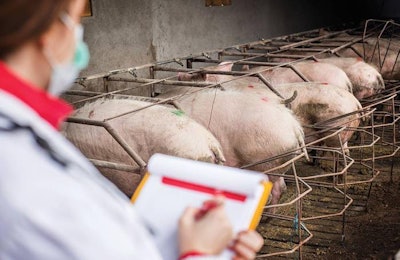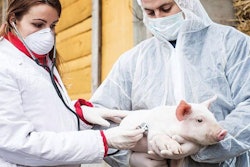
Outbreaks of African swine fever in domestic pigs have been confirmed over the past two weeks in Italy, Poland, Romania, Russia, Slovakia and Ukraine.
Over the past two weeks, African swine fever (ASF) cases in domestic pigs have been registered in six European countries.
Among the significant developments is a first outbreak in Italy in almost two years. Cases were reported to the European Commission (EC) through its Animal Disease Notification System. No details are published.
In 2020, 41 cases of ASF cases were recorded in wild boar in Italy, according to the EC. The most recent cases in domestic swine was a single outbreak in January 2019.
On the nation’s island territory of Sardinia, feral pigs without owners are periodically rounded up by the authorities, and culled as a measure to control ASF. Earlier this week, Alguer reported that 41 animals had been subjected to these controls in one district. According to Sardinia Post, 78 pigs were culled at another location during the previous week.
Outbreaks in Europe’s domestic swine pass 1,800
So far this year, 1,844 outbreaks have been confirmed among domestic pigs, according to the latest update of the EC’s notification system (as of December 19). ASF cases have been recorded in 10 countries in 2021.
For comparison, 1,240 ASF outbreaks in 10 states in the region were registered with the EC System during the whole of 2020.
Of the states registering cases through this system this year, four nations in addition to Italy have recorded new outbreaks since the previous update (on December 5). These include the worst-affected country, Romania (now with 1,648 outbreaks so far this year).
Also notifying the EC of new cases of the disease during December have been Poland (124 outbreaks for the year so far), Ukraine (13) and Slovakia (11).
Latest situation in Poland, Romania, Russia, Ukraine
Poland’s latest cases were in one herd of 80 pigs in Holy Cross, and another comprising 117 in Warmia-Masuria. These provinces are located in central and northeastern Poland, respectively. Based on information from the national chief veterinary office, these cases bring the total number of pigs directly impacted by ASF in the country so far this year to more than 43,800.
In Ukraine, the first cases in the current wave of ASF in the western region of Chernivtsi were detected in early November. In mid-December, a second outbreak was confirmed in domestic pigs. Latest to be affected was a backyard herd of just two animals, according to the official report to the World Organisation for Animal Health (OIE).
Over the past two weeks, Romania’s animal health agency has recorded a total of 46 new ASF outbreaks with the OIE. Directly impacted have been 3,551 pigs. Of these, 43 outbreaks were detected in small backyard herds. There was also one case in a domestic pig at a zoo, and another in a natural park. In the south of Romania, the virus was detected at a commercial farm after five out of 2,951 animals died in the first week of December.
EC does not monitor the disease situation in Russia. Over the past week, two outbreaks in non-commercial pig herds have been registered with the OIE by the nation’s authorities.
Located in the Volga federal district, the Orenburg region had been free of ASF cases for several months until the end of November. All 17 animals in the affected herd died.
In the first week of December, a second backyard herd in the Saratov region tested positive for the ASF virus. There were three cases including two deaths among the 38 animals. Saratov is also part of the Volga district.
Cases in European wild boar pass 11,700
Through its notification system, EC has been informed of a total of 11,712 outbreaks of ASF among wild boar in 2021 (to December 19). This is an increase of 520 from the previous edition on December 5.
For comparison, total outbreaks across the region reported to the EC during the whole of 2020 was just over 11,000 outbreaks in 14 countries.
Recording the most outbreaks in Europe so far this year is Poland with a total of 3,023. With an additional 232 outbreaks, the nation also registered the biggest increase over the two-week period.
Hungary’s total stands at 2,568 outbreaks, followed by Germany (2,431), Slovakia (1,622), Latvia (338), Bulgaria (318) and Lithuania (238). Also registering new cases were Estonia and Italy, with their totals standing at 67 and 14, for the year so far, respectively.
From Russia come reports to the OIE of three new ASF outbreaks in wild boar. This included one case in each of the Northwestern federal district regions of Novgorod and Pskov, and two at one location in Kostroma in the Central district.
Germany’s wild boar cases pass 3,000
In eastern Germany, the number of wild boar that have tested positive for the ASF virus has risen to 3,045. This figure includes all cases in the wild population since the first case in September 2020.
This total comprises 2,287 in the eastern state of Brandenburg, 771 in neighboring Saxony, and seven in Mecklenburg-West Pomerania (as registered with the OIE).
Virus-positive wild animals have been found in seven districts in Brandenburg, three in Saxony, and two in Mecklenburg-West Pomerania.
Germany’s approach to ASF control has recently received praise from the European Union emergency veterinary team, according to the federal agriculture ministry.
New federal agriculture minister Silvia Bender stressed the importance of all three affected states working together and with others to gain control of the disease. Aims are to achieve the control and ultimately the eradication of ASF. This will require the wild boar population to be greatly reduced, she said. Monitoring of domestic and wild population is set to continue.
Discussions are ongoing with the EC, according to Bender, on how to provide better support for German pig farmers. Among the options is support for those who wish to get out of production temporarily.
View our continuing coverage of the global African swine fever situation.

















